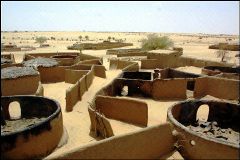Sudan’s foreign minister says only 5,000 dead in Darfur
TOKYO, Sept 8 (AFP) — Sudan’s foreign minister said Wednesday that fewer than 5,000 people have died in the country’s war-torn Darfur region, far short of a UN estimate of 30,000 to 50,000 dead.
 “Those who are saying 30,000 or 50,000, we are telling them, ‘Tell us the names’,” Mustafa Osman Ismail told a press conference. “Show us the graves where these people have been buried.”
“Those who are saying 30,000 or 50,000, we are telling them, ‘Tell us the names’,” Mustafa Osman Ismail told a press conference. “Show us the graves where these people have been buried.”
“According to our own analysis… it’s not more than 5,000. Anybody who says other than this, we challenge them,” Ismail said.
The estimate fell far short of one made earlier in Tokyo by UN High Commissioner for Refugees Ruud Lubbers.
He said 30,000 to 50,000 people had been killed since fighting began in February 2003 between anti-government rebels, militias, government forces, and what is known as Sudan’s proxy Arab militia, the Janjaweed.
Sudan’s government missed a UN deadline set for the end of August to disarm the Janjaweed and to withdraw its regular forces from around the camps of the displaced.
Ismail, who arrived on Sunday to meet top Japanese government officials, said Sudan was responsible for disarming the militia and Janjaweed, but the African Union (AU) forces should disarm rebels — a process that has not begun yet.
“It should take place simultaneously and together. So we are waiting for the talks in Abuja now to finalize the situation,” he said.
AU-sponsored talks on restoring security in Darfur resumed Wednesday in Abuja, bringing rebels and the government face to face after a six-day deadlock.
Ismail was to meet later with Lubbers in Tokyo.
Lubbers earlier told reporters: “Because of the conflicts (in Sudan), a large number of people became uprooted — between one million and 1.5 million. Thirty thousand to 50,000 were killed, 200,000 people crossed the border to Chad.”
Lubbers said he was wary of being given a rosy scenario by Ismail.
“The minister will say to me and to you probably that there is already peace on the ground. I will say to him, ‘We need sustainable peace on the ground’,” Lubbers said.
“Maybe he will portray things a bit too rosy. I see there are still crying faces of all those people,” Lubbers said.
Lubbers said that in several weeks he would travel to Chad, on Sudan’s western border, with representatives from prospective donors, the United States, Japan, the European Union and the African Union to rally help for the 200,000 refugees there.
Japan also said it planned to send a mission to Sudan in late September to examine the situation and see what it can do to help.
Ismail also said he requested more troops from the AU commissioner for peace and security, Ambassador Said Djinnit, who was also in Tokyo.
“I told him that we need more African monitors to come and to help,” Ismail said of his meeting Monday with Djinnit.
“He promised me that immediately he would go back, he would present a proposal to the government of Sudan,” Ismail said. “Whatever the African Union suggests, we will adopt it and we will work on it.”
The AU decided in July to send 300 soldiers and 176 observers to Darfur and has said it will send more troops to the region if asked.
